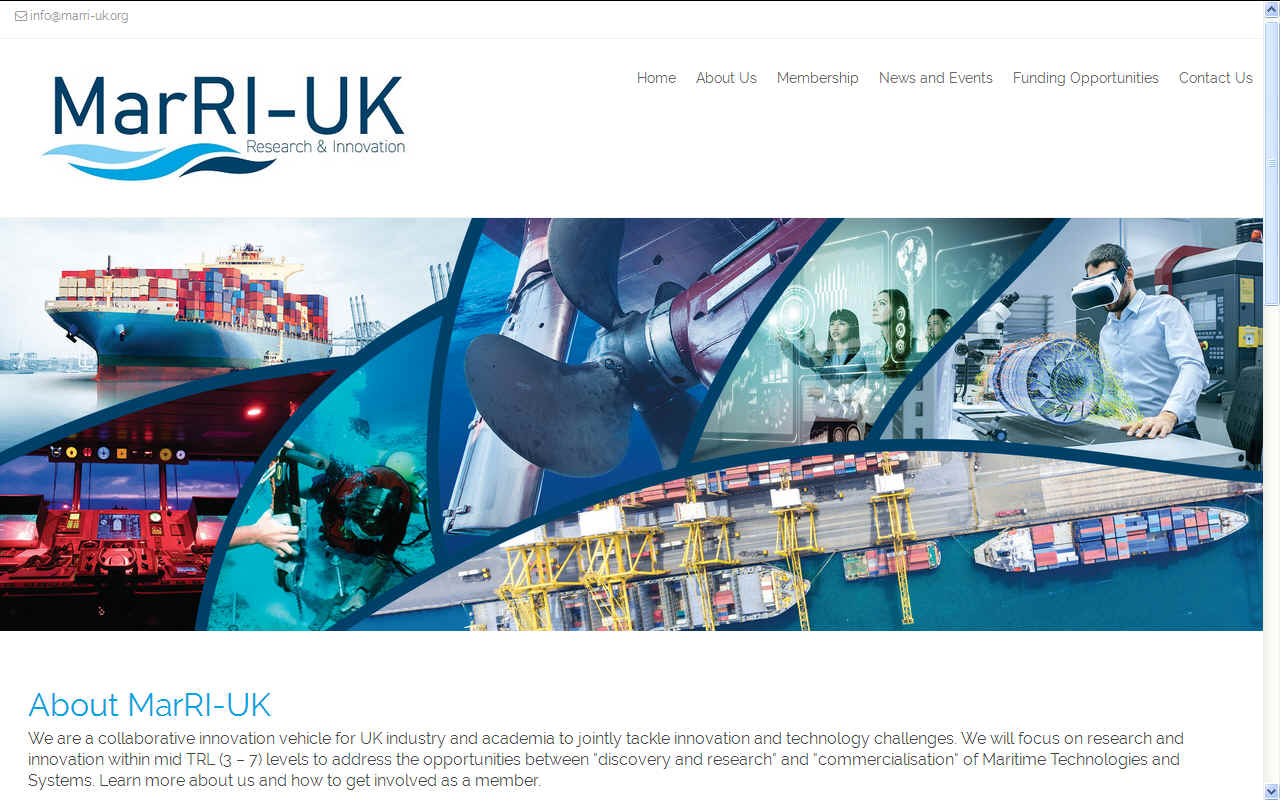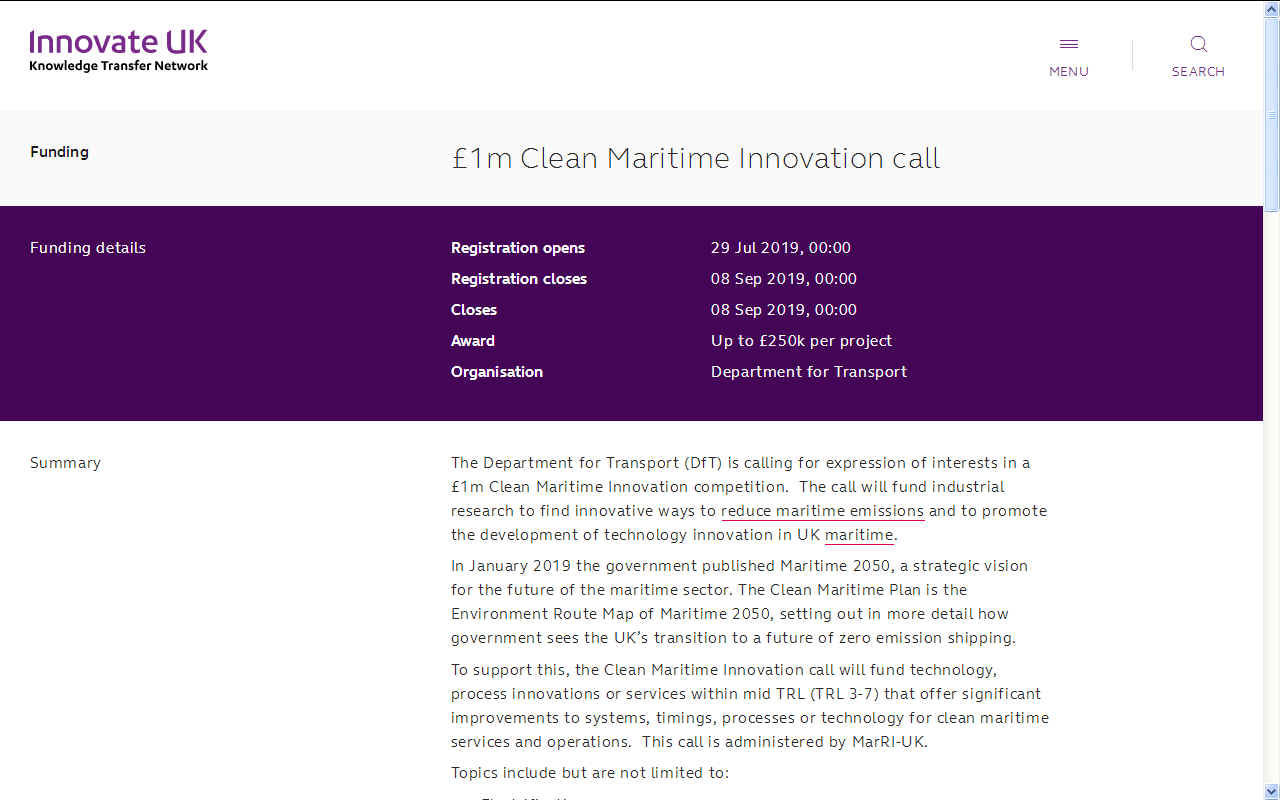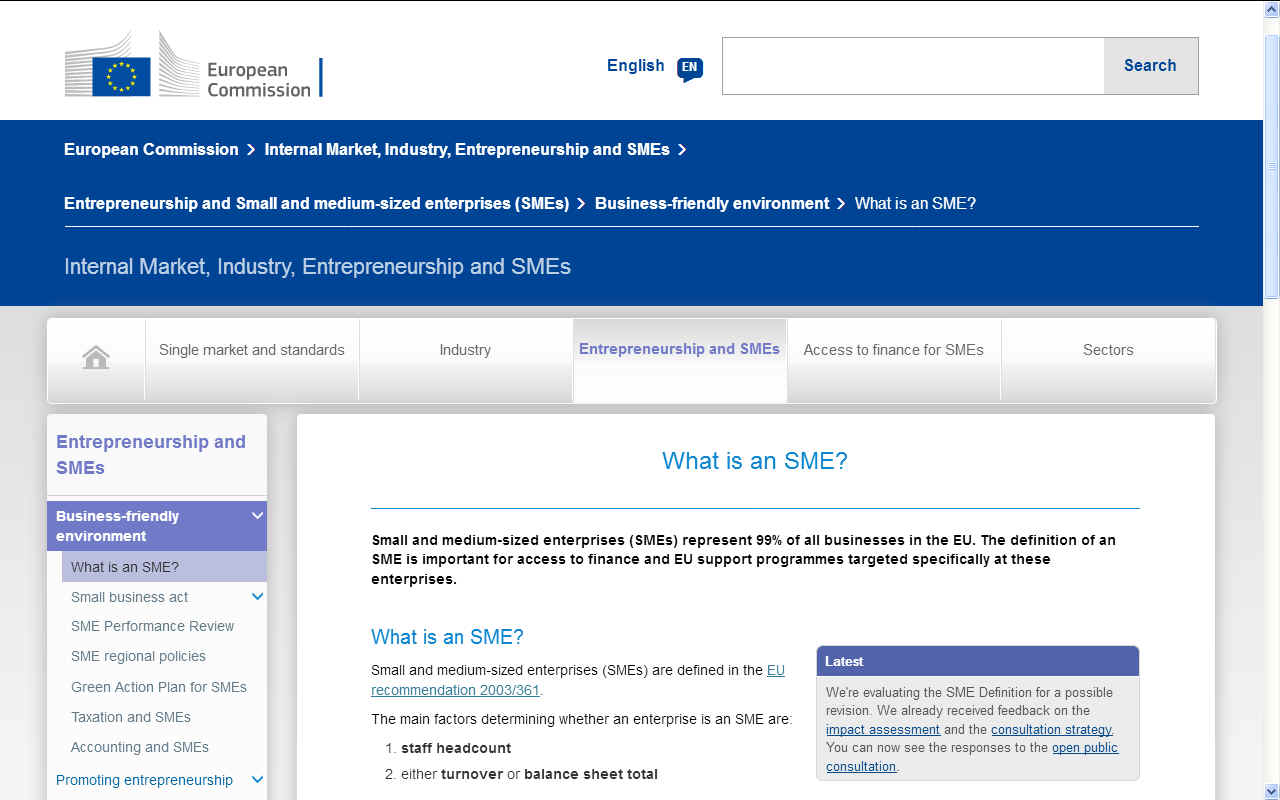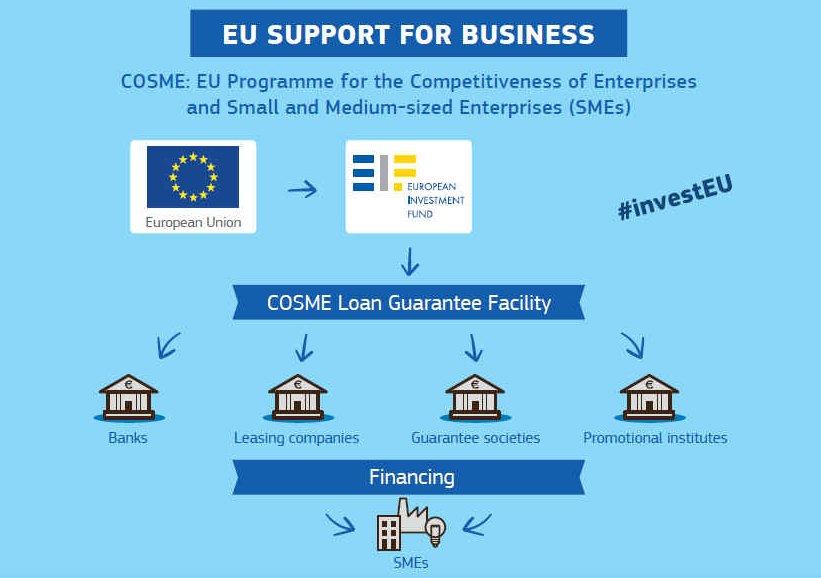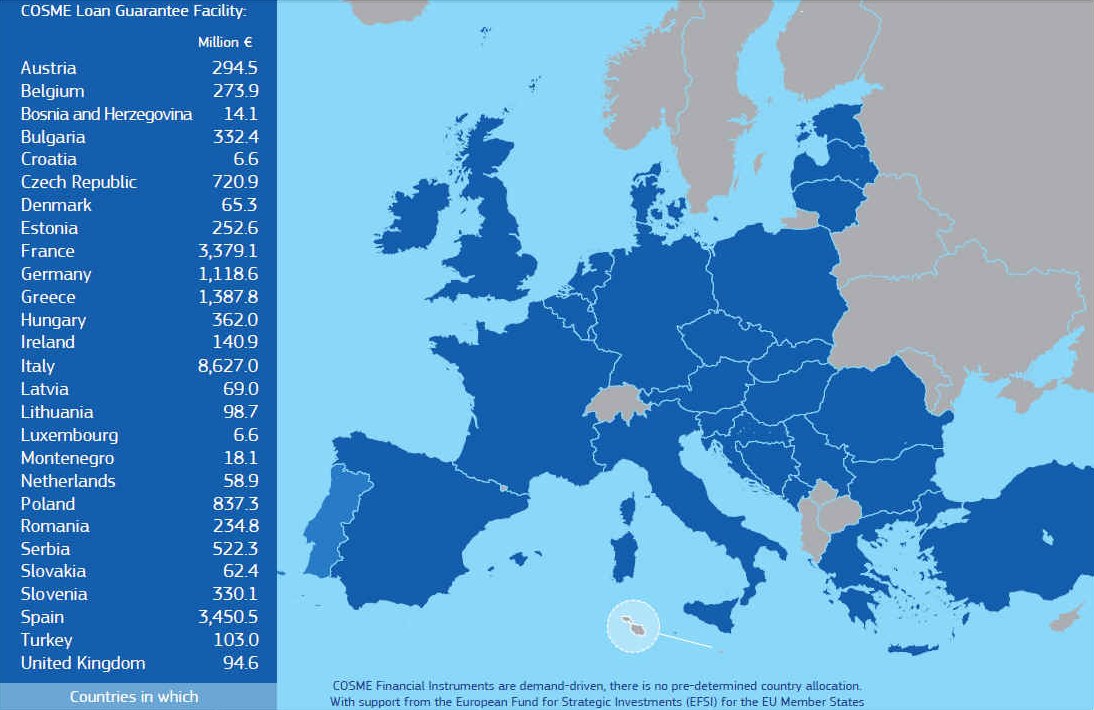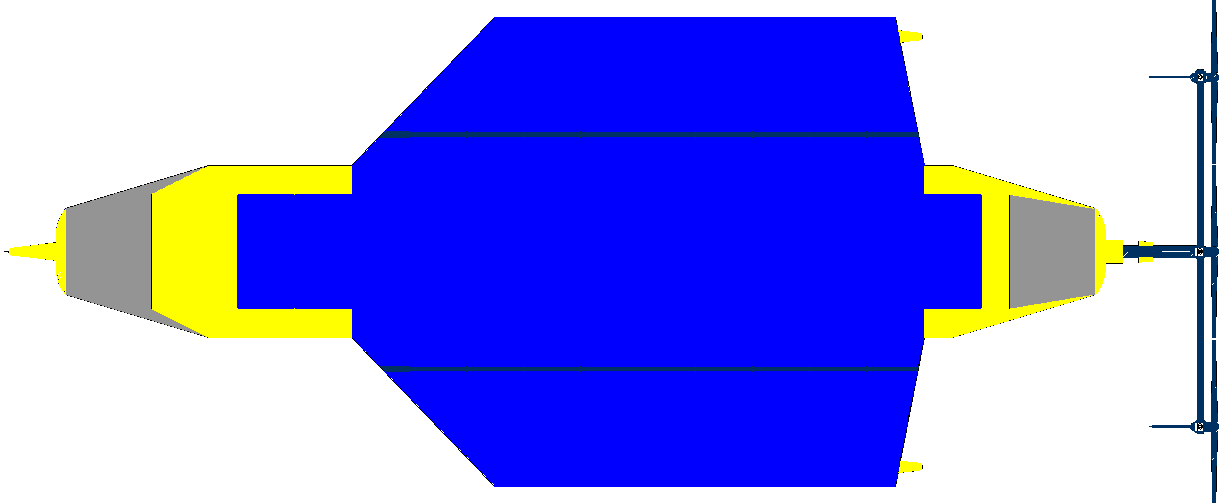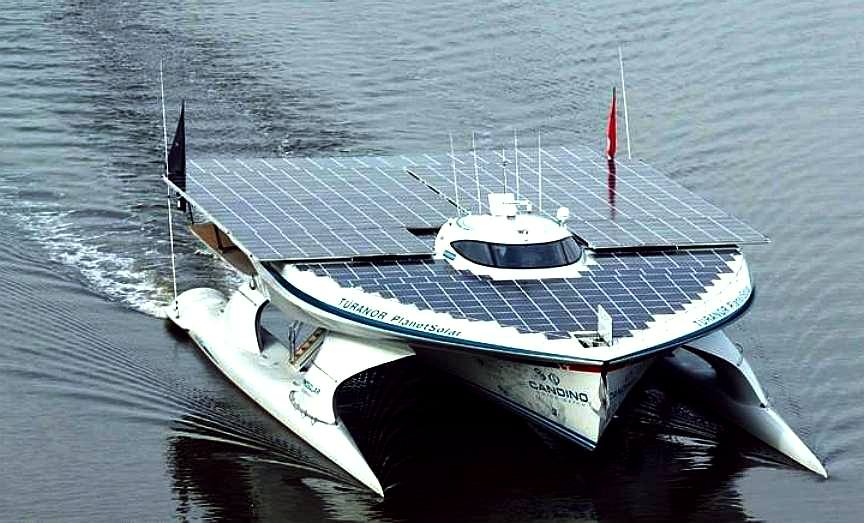|
KTN MarRI-UK CLEAN MARITIME INNOVATION
Please use our A-Z INDEX to navigate this site where page links may lead to other sites
|
|
MariRI is a collaborative innovation vehicle for UK industry and academia to jointly tackle innovation and technology challenges. They focus on research and innovation within mid TRL (3 – 7) levels to address the opportunities between "discovery and research" and "commercialisation" of Maritime Technologies and Systems.
MarRI-UK is an open tier-level membership organisation, for UK companies and researchers.
Funding Opportunities
To support this, the Department for Transport (DfT), is launching an innovation call of £1M called the Clean Maritime Innovation Call. The call will fund technology, process innovations or services within mid TRL (TRL 3-7) that offer significant improvements to systems, timings, processes or technology for clean maritime services and operations. £1M is available for competition.
This call is administered by MarRI-UK.
This is an Expression of interest (EOI) competition. There are 2 (two) stages and the whole process takes at least 7 (seven) months.
Expression of Interest (EoI): opens for 6 weeks and is reviewed by MarRI-UK only.
Full proposal: invite only, if successful in the expression of interest stage.
This is an Expression of Interest (EoI) competition. Successful applicants will be invited to submit full proposal (Stage 2). A decision to proceed to Stage 2 will depend on the outcomes from this EoI. Changes from your EoI to proposal will be monitored. Unjustified major change is not acceptable.
Topics
-
It is the applicants’ responsibility to be State Aid compliant and demonstrate their bid falls under the General Block Exemption Rules (GBER) for State Aid compliance. Please take legal advice if unsure.
It could also be to fund some of the project, in the case of smaller business, but receive the bulk of the funding from us.
In any case a business case for how they will match fund, or why they cannot, should be submitted alongside the bid.
-
70% for a small business, with 30% from the bidder,
Business size definition:
Stage 2
-
21 October: Invitation to submit full proposal release, submission for full proposal open
CREATE ACCOUNT & LODGE EXPRESSIONS HERE
ADD TO LODGED EXPRESSIONS HERE
You can save your application and return to change and/or complete your application as much as you want before the deadline.
Project information
CONTACTS
Phone: 0141 574 5271
Call for Proposals
- £1M is available to fund technology, process innovations or services within mid TRL (TRL 3-7) that offer significant improvements to systems, timings, processes or technology for clean maritime services and operations.
The above call is in addition to European H2020 calls where sums are larger for more comprehensive projects. The Commission, like the UK's DOT, hopes to generate new knowledge and technologies, for a strong economic impact. For every 100 euro they invest through Horizon 2020, the Commission expect to add 850 euro to their GDP by 2030, creating millions of jobs for Europeans. That is why they have proposed €100 billion for the next Horizon Europe programme, to boost the EU's competitiveness, innovation capacities and scientific excellence.
WHAT IS AN SME?
Small and medium-sized enterprises (SMEs) are defined in the EU recommendation 2003/361.
These ceilings apply to the figures for individual firms only. A firm that is part of a larger group may need to include staff headcount/turnover/balance sheet data from that group too.
COSME is the EU programme for the Competitiveness of Enterprises and Small and Medium-sized Enterprises (SMEs) running from 2014 to 2020 with a total budget of €2.3 billion. At least 60% of the programme will be devoted to easing access to finance for SMEs in Europe, with two financial instruments. The COSME Loan Guarantee Facility (LGF) supports guarantees and counter-guarantees to financial institutions to help them provide more loans and lease finance to SMEs. This facility also includes securitisation of SME debt finance portfolios.
The COSME programme also invests through the COSME Equity Facility for Growth
(EFG). The EFG is dedicated to
The COSME programme builds on the success of the Competitiveness and Innovation Framework Programme (CIP)
The Investment Plan for Europe, the so-called Juncker Plan, is one of the European Commission’s top priorities. It focuses on boosting investments to create jobs and growth by making smarter use of new and existing financial resources, removing obstacles to investment and providing visibility and technical assistance to investment projects.
The European Fund for Strategic Investments (EFSI) is the central pillar of the Juncker Plan. It provides a first loss guarantee, allowing the EIB to invest in more, often riskier, projects. The EFSI is showing concrete results. The projects and agreements approved for financing under the EFSI so far are expected to mobilise more than €371.2 billion in investments and support over 856 000 SMEs across all 28 Member States.
LINKS & REFERENCES
https://ktn-uk.co.uk/funding/1m-clean-maritime-innovation-call https://www.marri-uk.org/ https://ec.europa.eu/growth/access-to-finance/cosme-financial-instruments_en https://ec.europa.eu/growth/smes/business-friendly-environment/sme-definition/
Please use our A-Z INDEX to navigate this site
GUINNESS BOOK OF RECORDS - The first climate friendly blue water cruiser was the MS Turanor PlanetSolar (Switzerland) which circumnavigated the world in a westward direction from Monaco in 1 year 7 months and 7 days from 27 September 2010 to 4 May 2012. Why nobody has improved on the concept since then is a source of wonder. The problem with PlanetSolar in terms of take-up was the limited speed, that operators of commercial lines would be likely to see as uncompetitive.
|
|
|
This website is provided on a free basis as a public information service. copyright © Climate Change Trust 2019. Solar Studios, BN271RF, United Kingdom.
|
